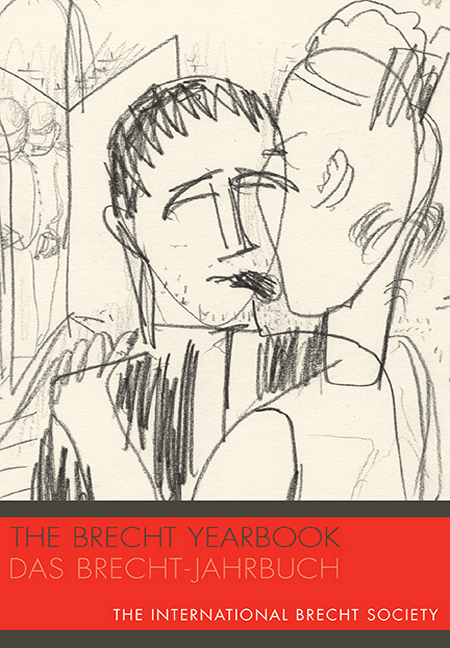Book contents
- Frontmatter
- Contents
- Editorial
- Tribute
- Documents from the Inaugural 24h DURCHEINANDER in Berlin
- Brecht-Images: Artist’s Introduction
- New Brecht Research
- The Temporality of Critique: Bertolt Brecht's Fragment Jae Fleischhacker in Chikago (1924–1929)
- Apparate und Körper: Überlegungen zu Bertolt Brechts Radiolehrstück Der Ozeanflug
- Wer ist Oscar? Ein unveröffentlichter Brief an Brecht vom 12. Juni 1918 aus schottischer Kriegsgefangenschaft
- “leg das buch nicht nieder, der du das liesest, mensch”: Brechts Gedicht “Die Nachtlager”
- Übersehen oder verbannt? Hanns Eislers Bilder aus der Kriegsfibel
- Special Insert: Accompaniments to Brecht, Music, and Culture
- Framing Two Accompaniments to Brecht, Music and Culture: Hanns Eisler in Conversation with Hans Bunge
- Introduction to Hanns Eisler Gespräche mit Hans Bunge: Fragen Sie mehr über Brecht
- Memories of Hans Bunge: on the occasion of his ninetieth birthday, 3 December 2009
- Das “Wiedersehen”: Der chinesische Dichter und Germanist Feng Zhi und Bertolt Brecht
- Brechtian Challenges to Theater Artists during the Internal War in Peru
- “Good Woman should have been done in one of our big theaters long before this”: Brecht, the Students, and the Making of the New Wave of Australian Theater
- Mark Twain's “Magnanimous-Incident” Hero and Bertolt Brecht's Der gute Mensch von Sezuan
- Navid Kermani's Literary Reflections: On Kafka, Brecht, and the Koran
- Karl Kraus und Bertolt Brecht: Über die Vergleichbarkeit des Unvergleichlichen
- Book Reviews
- Notes on the Contributors
Memories of Hans Bunge: on the occasion of his ninetieth birthday, 3 December 2009
from Special Insert: Accompaniments to Brecht, Music, and Culture
Published online by Cambridge University Press: 11 March 2017
- Frontmatter
- Contents
- Editorial
- Tribute
- Documents from the Inaugural 24h DURCHEINANDER in Berlin
- Brecht-Images: Artist’s Introduction
- New Brecht Research
- The Temporality of Critique: Bertolt Brecht's Fragment Jae Fleischhacker in Chikago (1924–1929)
- Apparate und Körper: Überlegungen zu Bertolt Brechts Radiolehrstück Der Ozeanflug
- Wer ist Oscar? Ein unveröffentlichter Brief an Brecht vom 12. Juni 1918 aus schottischer Kriegsgefangenschaft
- “leg das buch nicht nieder, der du das liesest, mensch”: Brechts Gedicht “Die Nachtlager”
- Übersehen oder verbannt? Hanns Eislers Bilder aus der Kriegsfibel
- Special Insert: Accompaniments to Brecht, Music, and Culture
- Framing Two Accompaniments to Brecht, Music and Culture: Hanns Eisler in Conversation with Hans Bunge
- Introduction to Hanns Eisler Gespräche mit Hans Bunge: Fragen Sie mehr über Brecht
- Memories of Hans Bunge: on the occasion of his ninetieth birthday, 3 December 2009
- Das “Wiedersehen”: Der chinesische Dichter und Germanist Feng Zhi und Bertolt Brecht
- Brechtian Challenges to Theater Artists during the Internal War in Peru
- “Good Woman should have been done in one of our big theaters long before this”: Brecht, the Students, and the Making of the New Wave of Australian Theater
- Mark Twain's “Magnanimous-Incident” Hero and Bertolt Brecht's Der gute Mensch von Sezuan
- Navid Kermani's Literary Reflections: On Kafka, Brecht, and the Koran
- Karl Kraus und Bertolt Brecht: Über die Vergleichbarkeit des Unvergleichlichen
- Book Reviews
- Notes on the Contributors
Summary
“A man in the century of wolves”—this phrase coined by Heiner Müller during Hans Bunge's funeral on 7 June 1990 at the Dorotheenstädtische Cemetery says it all, but it would be wrong to remember Bunge only for this. Whoever thinks of Bunge should, beside the twists and turns, and the unavoidable failures, also be conscious of his delight in discoveries, experimentation, and accomplishments. In his independent and resolute way Bunge remained true to himself even under difficult and hostile circumstances. The following memories are a kind of kaleidoscope, incomplete and haphazard, but they're in keeping with the vicissitudes of life, the search and the occasional, unexpected resolution. This is not, therefore, a biographical account of his education and career; instead, snapshots, large and small, of the qualities and twists of fate that made an indelible impression on me.
This bright boy from a German nationalist—later strict National Socialist—family is beyond my knowledge. Already in school he had the nickname “Blitz” because he was always top in mental arithmetic; a boy who joined the Nazi Party out of conviction at the age of nineteen and who went into the worst of all wars at twenty; who advanced to the rank of regimental adjutant during the invasion of Russia, who was taken prisoner and who, thus, survived; who, after the collapse of the Third Reich and six years of hard labor in different Russian prison camps returned—unreformed: the century of wolves had a relentless grip on him from the beginning.
Bunge was already thirty when, with an incredible volte-face, he began his real life. His studies in Greifswald made him aware—initially from an antagonistic point of view—of what would become the most important point of reference in his life, namely Brecht. Unquestionably, a kaleidoscope that recollects fragments of Bunge's past must start with Brecht. And what comes naturally to mind is the “Legend of the Origin of the Book Tao- Te-Ching on Lao-Tsu's Road into Exile”:
But the honor should not be restricted
to the sage whose name is clearly writ.
For a wise man's wisdom needs to be extracted.
So the customs man deserves his bit.
It was he who called for it.
- Type
- Chapter
- Information
- The Brecht Yearbook / Das Brecht-Jahrbuch 40 , pp. 133 - 143Publisher: Boydell & BrewerPrint publication year: 2016

